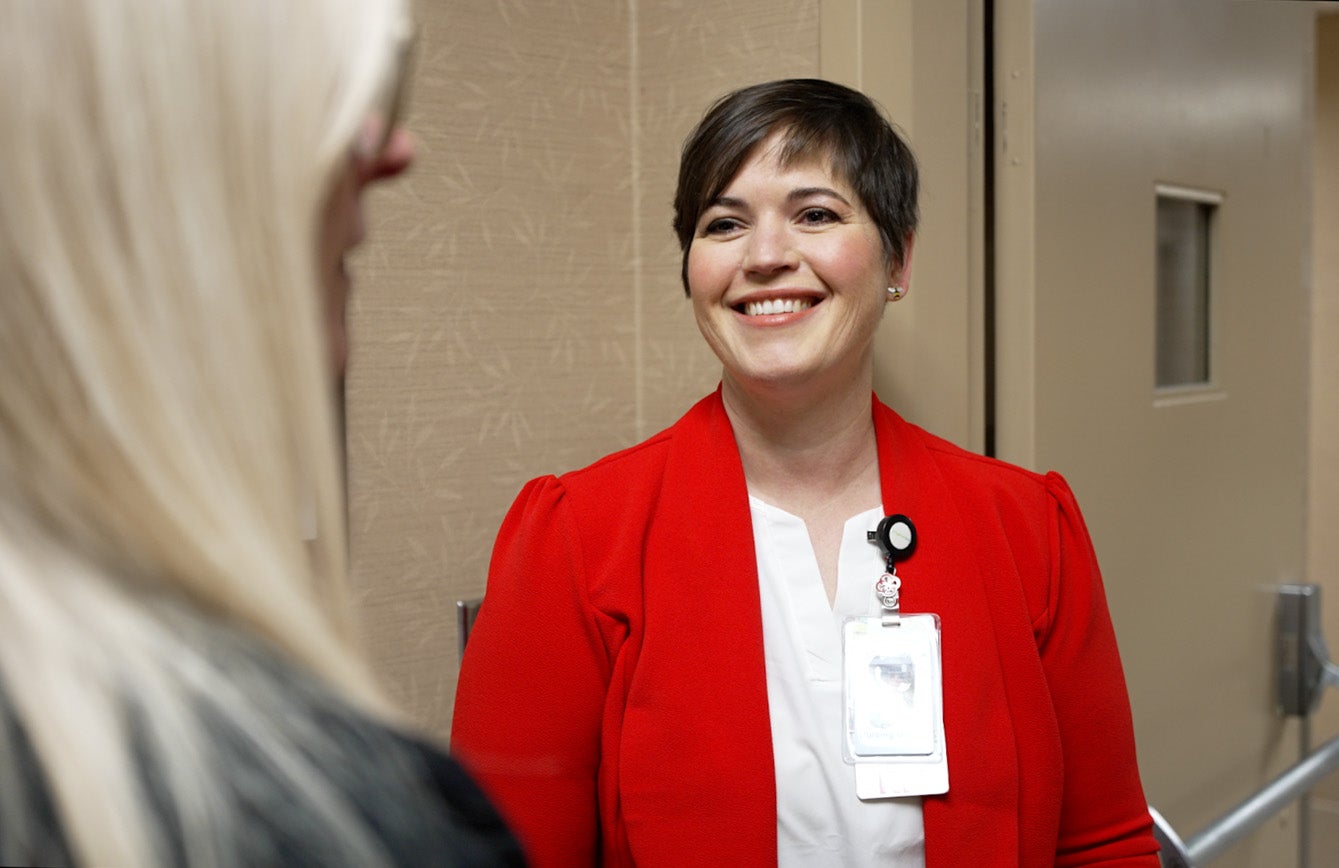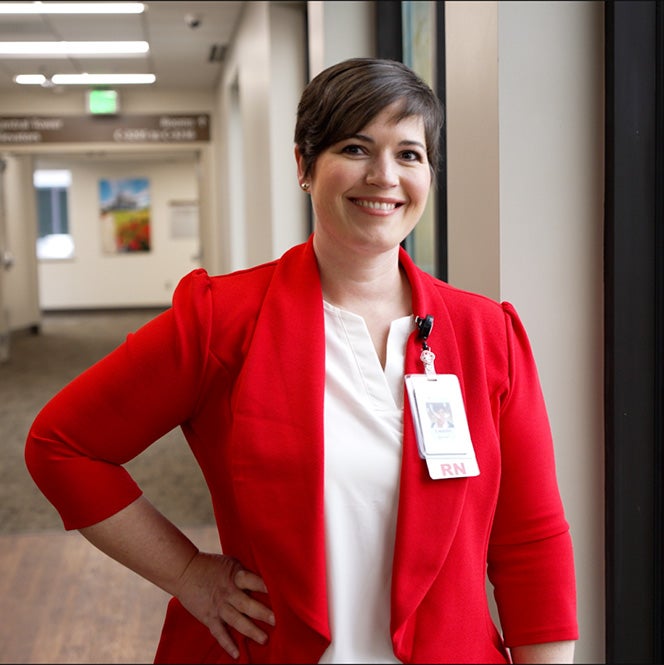
Alum Lauren Smith (’03) is the regional chief nursing officer at Saint Alphonsus. Her path in nursing took a turn she didn’t intend, but looking back now, she knows she benefited from it.
Raised in Boise, Smith originally thought she’d pursue medical school. But her mother is a nurse, and the more Smith learned about a nurse’s role, the more she knew that was the career for her.
“What was particularly impactful to me are the relationships the nurses get to build while they’re taking care of patients,” Smith said. “That appealed to me.”
While attending the on-campus bachelor’s program at Boise State, medical-surgical clinicals were not Smith’s favorite. She said it was “fixed in my head” not to go into a medical-surgical position post-graduation; Smith wanted to be a trauma nurse (“I liked being where the action was”).
Smith knew she needed at least a year in the intensive care unit before she could transition to the trauma unit. But at the time, her mother was the director of the Intensive Care Unit at Saint Alphonsus, which would have caused a conflict of interest in the supervisory reporting relationship.
So when she wasn’t in classes, Smith was working full-time in the Emergency Department at St. Luke’s, typically staffing the 3 p.m. to 4 a.m. shift. Nearing Smith’s graduation, the leader in the St. Luke’s intensive care unit told her they could only hire one nursing student. But they were going with another candidate.
So Smith interviewed in a number of other departments at St. Luke’s. She ended up in the Clinical Support Unit (float pool), hoping for a variety of work and – ironically – starting in med-surg.
“I think sometimes we don’t realize why things are happening around us, but this was the lesson that I learned: that everything really happens for a reason,” Smith said.Lauren Smith
“If I hadn’t gone to the float pool, there’s no way that I would have experienced all the things that I had moving down the road,” she said.
From floating to leading
After a few years she was floating all over Boise, Meridian, and Wood River (Hailey, Idaho) hospitals, meeting many new people and gaining knowledge in various units. It was also during Smith’s time in the float pool that she experienced being a first responder to a medication error. This sparked her passion for patient safety.
“That’s where I realized instead of impacting patients one at a time, I could start to impact them on a grander scale,” she said.
Over the next several years, Smith transitioned from the Clinical Support Unit to Patient Safety and then to Operations Improvement. “I wanted to impact patient care before negative events even happened,” she said. She moved further from the trauma nurse role she first thought she wanted and deeper into administrative leadership.
After working 22 years with St. Luke’s, Smith decided that it was time to try something new. She transitioned to Saint Alphonsus and now serves as the Regional Chief Nursing Officer. “I’ve just really enjoyed it,” she said.
While Smith acknowledges that nurses often focus on amplifying patients’ voices, she wants to use her leadership position to hear the voices of everyone nurses interact with. This includes colleagues and nursing students.
Smith aims to bring fresh perspective to her position, focusing on listening and “tapping into the knowledge of our frontline teams to drive improvement and make things better, as far as care that’s offered to people living and visiting in our community.”
Pivoting the dream and discovering the benefit
During her time in the float pool, Smith learned to communicate on a deep level with patients and families going through difficult times, and she developed effective time management and documentation skills. Looking back, Smith doubts she would have learned them as efficiently if she went straight into trauma nursing.

“Because I was in a float pool, sometimes I could move patient assignments every four hours, depending on what was going on and where there was a need,” Smith said. “It meant that I had to develop the habits of staying on top of my documentation and not getting behind on medication administration or other tasks that needed to be completed.”
Now in her CNO role, she’s realized how crucial this kind of on-the-job training is. Smith witnessed critical care nurses floating to med-surg floors to help ease staffing shortages on these busy units. But she noticed these nurses – who specialize in complex care for one or two seriously ill patients – growing extremely stressed in these temporary assignments.
“It occurred to me that for those nurses that specialize right away, you don’t quite get enough [practice] in nursing school – in most cases – to get a good strong flavor of how to do time management, how to build that bond with your patient, and all the other things that need to happen that aren’t critical-care based,” Smith said. “And now we’re asking them to double their patient assignment, and I think it’s anxiety inducing, because it doesn’t come as easily to them.”
Considering her own experiences, Smith now sees the value in not specializing right away; it exposed her to different areas and gave her a level of comfort others don’t have. She recognizes that it’s easier for her to do her job – overseeing a host of different units across the health system – because she’s had experience in them herself. She’s able to identify with and understand the clinical teams she leads.
“If you’ve got your foundational elements established through that acute care, med-surg based experience, I think you can go anywhere,” she said. “If you start there, the sky’s the limit.”
Email nursingjobs@saintalphonsus.org for information about available nursing careers.
Boise State leaves an impact
Smith didn’t always see herself in leadership, but one of her first experiences came in nursing school. She stepped into the role of president of the Student Nurses Association (SNA), hoping to make a difference for her peers. Smith wanted to “help support them as they were going through nursing school and all the other things that were happening in the world at the time,” she said, referring to the attack on 9/11.
As it turned out, SNA produced some of Smith’s fondest memories, from creating a float for the homecoming parade to building lasting relationships with her peers.
“It’s nice to be able to go to school in the valley, and then stay and work in the valley,” Smith said. “For others in our graduating class who have done that, we’ve been able to stay connected over the years.”
Smith also particularly enjoyed her behavioral health class. While at work a few years after graduating, she encountered her instructor who candidly said: “You’re so good at behavioral health; why didn’t you go into that setting?”
But by that point, while working in the Emergency Department and then the float pool, Smith had realized: “Behavioral health is everywhere, whether it’s a well-behaved patient or a patient with a lot of things going on that are impacting their mental and physical health,” she said.
“I feel like every day is behavioral health day when you’re taking care of people in general. Regardless of what state they’re in, we’re always mindful of their behavioral health.”Lauren Smith
Reflecting on her time at Boise State, Smith will admit: she was not excited to take a holistic nursing course. But she’s now able to see the impact it had on her career.
“There was a gap in my skill set because I was so Emergency Department, ICU-oriented during nursing school,” she said. “Now I’m really glad I took that holistic nursing course, just to provide some different perspectives around how to have conversations with patients and their families, and now to use some of the same tools to connect with colleagues, too.”